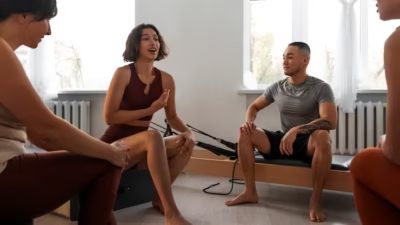There’s a quiet confidence in the way love can find its way back into someone’s life after sixty. It doesn’t show up with the same impatient pulse it once had in our twenties, when urgency and novelty often overshadowed clarity. Instead, it tends to arrive with a calm certainty, yet still manages to stir excitement in places you thought were long settled. It’s not a consolation prize. It’s not a “last chance.” It’s an entirely different experience, shaped by decades of life, losses, and triumphs that make every shared moment more meaningful.
Table of Contents
Relearning What Connection Feels Like
Love after sixty often starts with rediscovering what you actually want from another person. The long-held scripts — the ones about meeting milestones, raising families, or climbing together through careers — usually give way to simpler but richer goals. You’re not looking for someone to help you build a life from scratch. You’ve already built one. Now it’s about weaving someone into that life without losing yourself.
That shift makes dating feel less like an audition and more like a conversation worth having. You might find yourself less willing to tolerate games, delays, or mismatched intentions. But you’re also more likely to extend grace, knowing that every person carries their own complicated backstory by this stage in life. And unlike the hesitant pauses of youth, affection now tends to move forward without the need for constant reassurance.
How Past Ties Resurface in the Present
Sometimes new love arrives in old packaging. Finding old flames on Classmates or Facebook has become almost a rite of passage for the newly single or newly curious in this age group. A name you haven’t spoken in forty years pops up in your notifications, and suddenly you’re trading messages about prom nights, forgotten inside jokes, or the teachers you swore you’d never forgive.
These conversations can stay light, but sometimes they open the door to something unexpectedly serious. Shared history can offer a sense of familiarity, which feels especially appealing when the modern dating world seems alien. Still, it’s important to remember that the person you’re talking to now isn’t the same one who left town in 1979. Life changes everyone, and reconnecting works best when both people are willing to meet as they are now, not as they were in yearbook photos.
The Role of Modern Dating Platforms
Dating sites catering to older adults have stripped away a lot of the awkwardness once associated with online romance. Profiles are more candid, filters help match lifestyles rather than just appearances, and the stigma is gone. In fact, for many over sixty, online dating feels more comfortable than going to social events because it allows you to set your own pace. You can think about a response before sending it, check someone’s interests, and avoid the small talk that can stall in-person introductions.
Technology has also widened the pool. You’re no longer limited to who happens to live within a fifteen-minute drive. For those in rural or suburban areas, that’s a real shift. A retired teacher in Virginia can now meet a jazz-loving widower in Maine, and the first date might happen over video chat instead of coffee. These digital beginnings don’t diminish the romance. If anything, they make the first in-person meeting more intentional.
Re-framing Physical Confidence
Later-life romance inevitably involves confronting insecurities about appearance. Aging changes the body, but it also changes perspective. Attraction after sixty isn’t about erasing every wrinkle or looking like you did in your thirties. It’s about carrying yourself with assurance, even if you’ve got a knee that aches in the rain or a pair of glasses that’s been through three prescription updates.
That said, many people find a boost in investing in their own comfort and confidence. For some, that means updating a wardrobe, staying active, or experimenting with styles they once avoided. Others explore treatments like Botox, not from a place of chasing youth, but from wanting to feel as polished on the outside as they do inside. The point isn’t to meet anyone else’s standard. It’s to walk into a date feeling fully present and at ease in your own skin.
Balancing Independence and Partnership
One of the biggest shifts in love after sixty is the question of space. You’ve lived independently for years, maybe decades, and the thought of blending daily routines can be both thrilling and intimidating. Successful relationships at this stage often hinge on respecting each other’s autonomy. You can enjoy long weekends together without feeling the need to merge households right away.
This independence also helps relationships grow without the friction that can come from constant proximity early on. You each have your own rhythm, your own circles, and your own ways of spending quiet hours. Rather than weakening the bond, this balance can make the time you do spend together more intentional and rewarding.
Handling Family Dynamics
Love later in life doesn’t exist in a vacuum. Adult children, grandchildren, and even long-standing friendships may have strong feelings about your new relationship. Some will welcome it wholeheartedly, while others may take longer to adjust. This isn’t necessarily about your partner, but about the changes your relationship represents.
The key here is clear communication. Let family members know they’re not being replaced, and give them time to see how this person enriches your life rather than complicates it. Often, initial hesitation melts away once they witness the happiness and stability you’ve found. And if it doesn’t, you’ll have to decide how much influence you’re willing to let those opinions have on your personal life.
The Emotional Weight of Saying Yes Again
Falling in love after sixty carries its own kind of vulnerability. You know more about loss, whether from divorce, death, or simply the end of significant chapters. That knowledge can make you cautious, but it can also make you braver. You’ve weathered enough to know that life rarely follows a tidy script, and that the risk of love is worth taking if it brings joy into your days.
This is why relationships formed later in life can feel especially grounded. You’re not pretending love will shield you from every hardship. You’re embracing it with eyes open, appreciating the way it adds warmth and dimension to a life you already value.
A Closing Word
Late-life love is not a softer, quieter echo of what came before. It’s its own story, written with the kind of honesty that only comes from living a full life. When the heart decides it’s ready again, the years behind you don’t stand in the way. They make the experience richer, the connection deeper, and the commitment steadier. Love after sixty isn’t about finding what you missed. It’s about discovering what you never knew you could still have.


